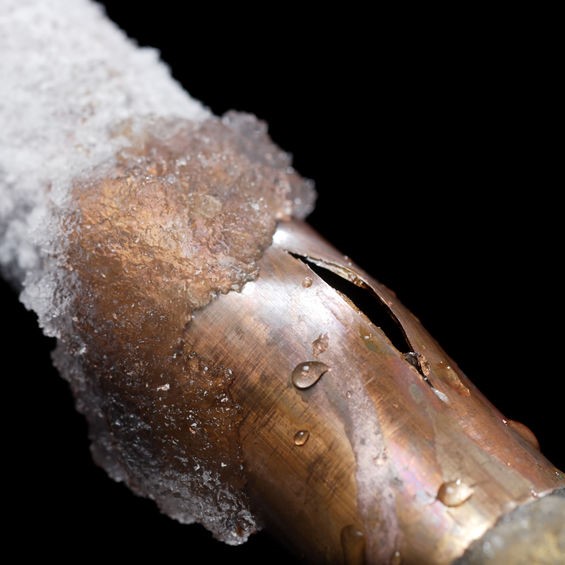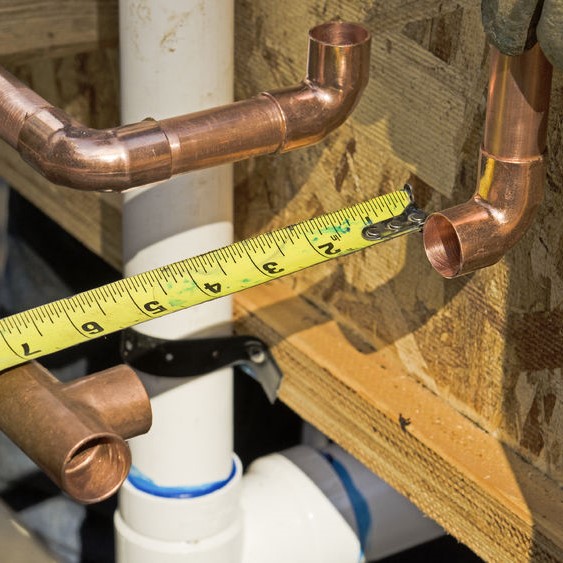
Winter and your plumbing
Winter can be a beautiful time of the year, especially with snow and the holidays. Until you experience frozen pipe. Repairs this time of the year can be costly and extensive, but with a little homeowner care, you prevent most frozen pipe repair needs.
So, what causes pipes to freeze? There are three major causes of frozen pipes:
- Quick drop in temperature
- Poor insulation
- Low thermostat setting
With a little money and time, there are steps you can do to prepare your home during the spring and summer when the weather is warmer to minimize, even prevent these things from happening and having to call professional frozen pipe repair service.
Now that we have established what causes pipes to freeze, here are steps you can take to minimize why do pipes freeze:
- Insulate your home’s pipes in the attic and crawl spaces. Exposed pipes are susceptible to being frozen even in climates where the winters aren’t as cold. The more pipe insulation used, the better you can minimize frozen pipe repair needs.
- Wrapping pipes with a high-grade heat tape or thermostatic heat cables. With this level of on-going heat through the pipes, it will eliminate possible frozen pipe repair needs. These products should be approved by electrical independent testing firms and only for a temporary time.
- Seal any areas where cold air can leak around or near the pipe locations. These are areas around dryer vents and washing machines, dishwashers, and water pipes. By using caulk or insulation in proper application and installation, you can keep the cold air out and eliminate the need for emergency frozen pipe repair service. Frozen pipe repair service calls are one of the most expensive services to need during the winter.
- Prior to winter, disconnect all garden hoses and install an indoor valve for emergency shut off. Drain all the water from the exterior pipes and reduce the possibility of frozen pipe repair needs.
- On a night when the weather is below freezing and a northern wind is blowing, leave indoor faucets trickling with both cold and hot water can keep frozen pipe repair needs.
- Keep the thermostat setting at the same temperature you have during the day for the evening too. The colder the temperature at night, the more likely you’ll wake up in the morning with a frozen pipe repair emergency.
- Keep cabinet doors open to allow your home’s heat to keep the interior water pipes warm.
How long does it take for pipes to freeze and burst?
Water pipes will freeze at 20 degrees Fahrenheit and lower, but there are factors that affect the speed of this happening such as:
- Insulated pipes – the better the pipes are insulated, but without any heat to the pipe, the pipes could freeze in six hours, resulting in frozen pipe repair needs.
- Poor insulation of pipes – with no pipe insulation, or a poor quality of insulation, the possibility of a freezing risk can be forthcoming within three hours with an exterior temperature of twenty degrees or lower, resulting in emergency frozen pipe repair service.
- On average – The average time for water pipes, requiring frozen pipe repair service, with temperature of twenty degrees or lower is between four and five hours.
How long does it take for pipes to unfreeze?
The use of hair dryers, heat lamps, and space heaters, or other common household heated items can thaw water pipes within forty-five minutes. These can be dangerous items to use when thawing pipes, which is why it is recommended to get professional frozen pipe repair service is advisable. The thawing of pipes can release pressure, causing the pipes to burst.
Do all frozen pipes burst?
Not all frozen water pipes will burst, but the ice thawing can increase the risk of it happening, causing the need for emergency frozen pipe repair service. The pressure raises as the pipes thaw, and any rapid change in the temperature can release that pressure.
Will frozen pipes thaw on their own?
Yes, they can unfreeze on their own, but it isn’t recommended. You can either take the following steps to thaw them yourself, or call a frozen pipe repair service to assist:
Step One: Turn the water faucets on and as they pipes thaw, they will begin dribbling water. Let the water keep running so the pipes will finish thawing.
Step Two: Find the pipes that are frozen, usually an exterior wall, unheated crawl space or under a sink.
Step Three: Apply heat safely to the frozen pipes with any of the following:
- heat pads
- hair dryers
- space heaters
- towels in hot water

Will PVC pipes burst if frozen?
No, PVC and CPVC pipe that are filled with water will not crack. Instead, they expand and contract with the temperature, absorbing the net volumetric expansion of ice. However, if there is localized freezing the water piping system, it could cause an ice plug and shut the water system down until thawed.
You may wonder can frozen pipes be repaired, and the answer is yes. It is recommended to hire a professional plumber that knows How to repair frozen pipes. If they are PVC pipes, replacing them is the easier option, and a homeowner with some general tool skills can do the repair. Your local big box home improvement store can provide the instructions and supplies needed to do your own frozen pipe repairs and save you money. Need help with a burst pipe in Indianapolis, IN? Call 317-677-4918 today!
